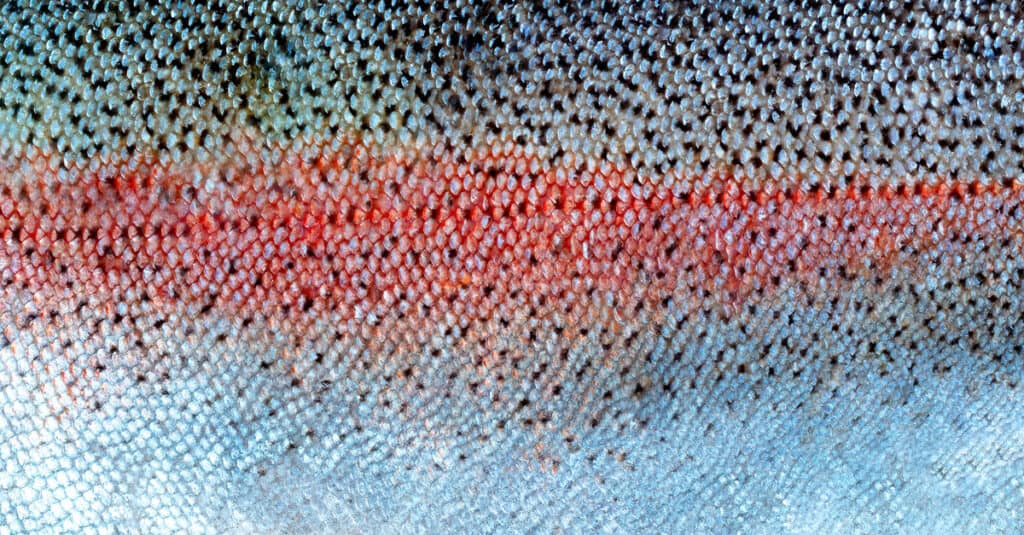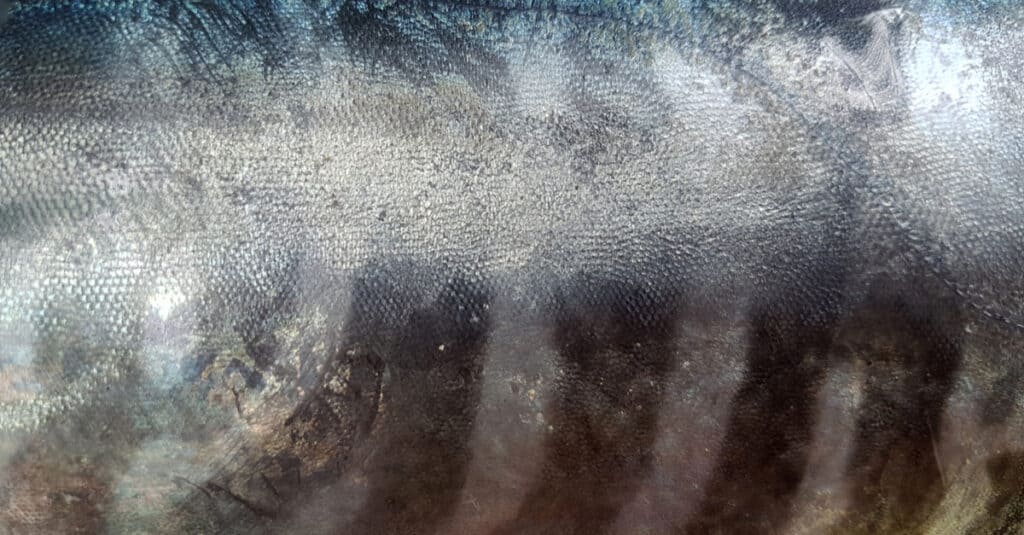Knowing the right food to give your dog is extremely important as a pet owner. Food plays a vital role in the health and by extension, lifespan of your dog. In this article, we would be considering if it is safe for dogs to eat salmon skin. Keep reading, as we explore everything you need to know about the impact of salmon skin on your dog’s health.
Can I Feed My Dog With Salmon Skin?

Salmon skin is safe for dogs to eat.
©tab62/Shutterstock.com
Salmon skin itself is completely safe for dogs. However, it is very high in fat. Therefore, it is not a very healthy regular treat. Over time, dogs may develop pancreatitis and similar illnesses from consuming too much fat.
Many of the seasonings and additives often found on salmon skin can be toxic to dogs. For instance, onions and garlic are toxic to canines. Therefore, salmon skin, as commonly prepared for people, is often a no-go. Instead, if you want to give your dog salmon skin, you’ll need to ensure that it is entirely plain.
Even a bit of added salt can be troublesome for many canines. While the salt we add to our food is often acceptable, the amounts are too significant for many canines.
Will Cooked Salmon Skin Hurt My Dog?
Assuming that there is nothing on the salmon skin, it should not be harmful to your dog. You should only give your canine cooked salmon skin, as raw skin can be potentially dangerous.
Raw fish can contain foodborne illnesses. While dogs are considered less at risk of these pathogens than humans, they can still become infected. Plus, the dogs can pass the pathogens through their feces – even if they aren’t showing any symptoms. Therefore, feeding your dog raw salmon skin can also be dangerous for you.
How Do You Feed Your Dog Salmon Skins?
If you have extra salmon skins you wish to prepare for your dog, there are several ways to go about it. After tossing them lightly in coconut oil, you can air fry these skins to make them crispy. You may also bake them as a healthy snack.
While you can prepare plenty of salmon skin treats for your dog, you shouldn’t give them too much. These treats will be high in fat. While dogs need quite a bit of fat in their diet, too much fat can be troublesome. It may even cause illnesses in the long run. Therefore, moderation is key.
You should not simply give your dog leftover salmon skins from something you’ve prepared yourself – usually. Humans often use seasonings on their salmon that dogs cannot have. Therefore, peeling the salmon skin off your food after you’ve prepared it won’t usually be a healthy option for your dog.
Is Fish Skin Toxic to Dogs?

You should give fish skin to your dog in moderation.
©Pictor20/Shutterstock.com
Fish skin can be healthy for your dog in moderation. These skins contain omega fatty acids, promoting a healthy coat and skin. Plus, fish skins are low in carbohydrates and extremely digestible.
However, they are also very high in fat. Therefore, you should be cautious when giving too many to your dog. While the fats included are good, too much of a good thing isn’t necessarily great.
Overconsumption of fat is connected to obesity, as you could probably guess. However, it may also cause pancreatitis and similar disorders – even if your dog remains at a healthy weight. Therefore, you should only give your dog fish skins in moderation as a treat.
Can Dogs Eat Salmon Skin with Scales?
Dogs can completely digest scales, though they may not be very appetizing to us. These scales are high in protein and contain omega fatty acids. There is no reason to remove the scales before feeding salmon skin to your pup.
However, many dogs do not find the surface scales appetizing, either. Therefore, they may refuse to eat the treat if the scales are intact. Some dogs may even try to lick the scales off and then spit them out, creating a mess. Plus, the scales can make it challenging to cook the skin, which is necessary before giving it to your dog.
What are the Benefits of Salmon Skin?
Salmon skin is a source of many vitamins that may be helpful for your canine. For instance, omega fatty acids are included in high amounts, improving your dog’s skin and coat. These fatty acids may also help with arthritis and brain health. There are many studies currently being performed on these helpful fats.
Furthermore, vitamins B and D are found in salmon skin, too. Vitamin D is vital for immune function, so it can help keep your dog healthy.
Salmon is also low in potentially harmful contents. For instance, it is much lower in carbohydrates than other typical treats. Therefore, it may help keep your dog at a healthy weight and improve their blood sugar.
With that said, very few studies have been done on dogs eating salmon skin, in particular. Therefore, there may be other benefits (or downsides) that we just don’t know about yet. Most benefits are assumed based on what we know about what salmon skin contains.
Up Next
The photo featured at the top of this post is © tab62/Shutterstock.com
Ready to discover the top 10 cutest dog breeds in the entire world?
How about the fastest dogs, the largest dogs and those that are -- quite frankly -- just the kindest dogs on the planet? Each day, AZ Animals sends out lists just like this to our thousands of email subscribers. And the best part? It's FREE. Join today by entering your email below.
Thank you for reading! Have some feedback for us? Contact the AZ Animals editorial team.






